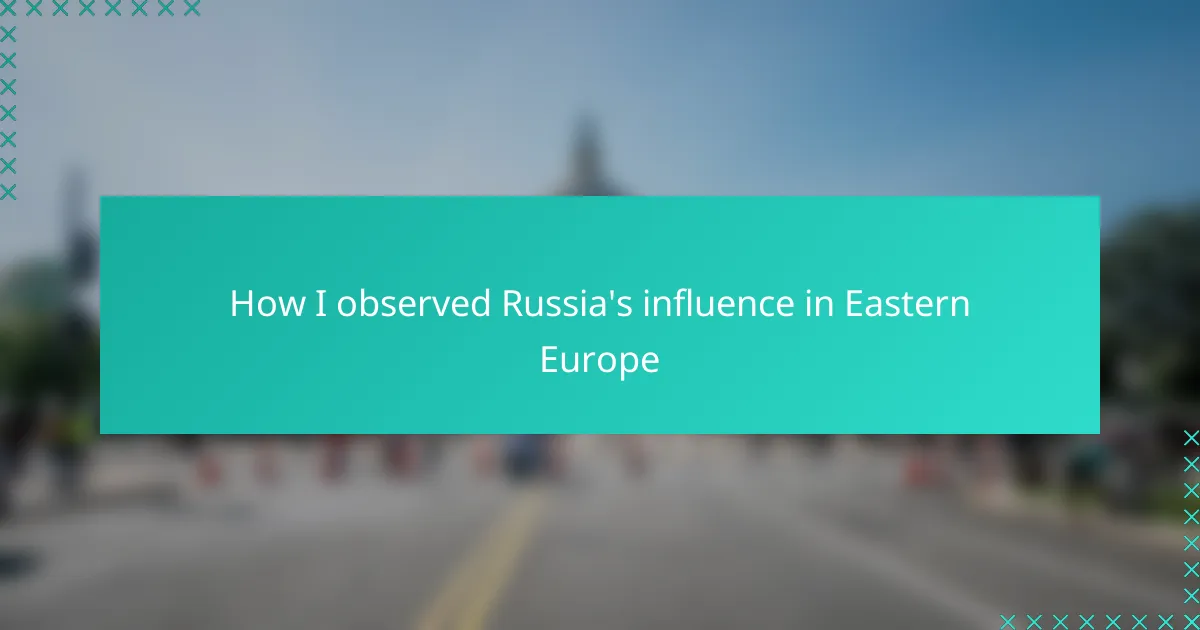Key takeaways
- Russia’s influence in Eastern Europe is complex, intertwining historical ties, cultural connections, and energy dependence, making it a blend of soft power and political maneuvering.
- Sovereignty in Eastern European nations is deeply affected by past conflicts and external pressures, leading to a fragile balance in political decisions.
- Practical signs of Russian influence include pro-Russian media shaping public opinion and energy dependence significantly impacting political choices.
- Political shifts often reveal polarization within societies, reflecting a struggle between national identity and external narratives, complicating the region’s geopolitical landscape.
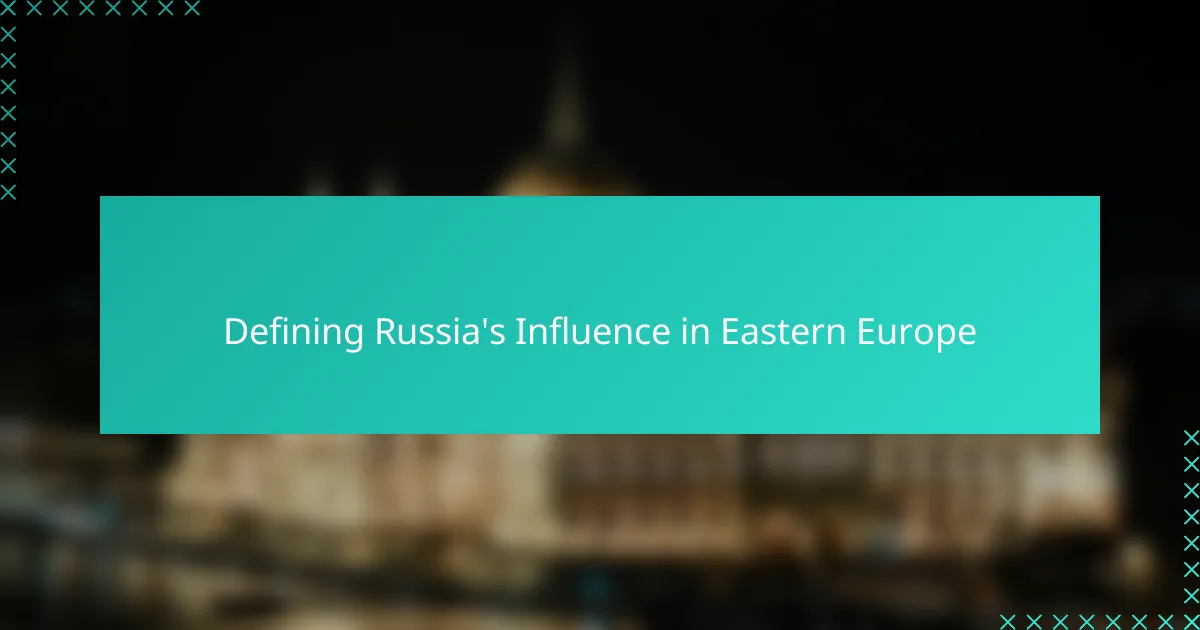
Defining Russia’s Influence in Eastern Europe
When I first started paying attention to Eastern Europe, Russia’s influence struck me not just as political maneuvering, but as a deep-rooted presence woven into the region’s identity. It’s hard to miss how history, culture, and energy dependence create a complex web that Moscow skillfully navigates. Have you ever wondered why some countries seem to teeter between resistance and cooperation with Russia? That tension is at the heart of defining what influence really means here.
To me, influence goes beyond military or economic forces—it’s about shaping narratives and perceptions. Russia often leverages media and historical ties to cultivate a sense of belonging or nostalgia, which complicates the political landscape. This subtle form of influence feels like a kind of soft power that’s simultaneously persuasive and persistent, making it harder to counteract than overt actions.
Reflecting on my conversations with people across Eastern Europe, I realized how personal and varied their experiences are. For some, Russian influence is a shadow that stifles sovereignty; for others, it’s a connection to a shared past that’s hard to discard. This duality is what defines Russia’s grip—it’s not a straightforward dominance but a layered reality that shapes everyday life in countless unexpected ways.

Key Global Politics Concepts
When I think about global politics, concepts like sovereignty, power projection, and soft power come to mind immediately. These aren’t just abstract ideas; they’re living forces that influence how countries interact, especially in a region as nuanced as Eastern Europe. Have you ever paused to consider how a country’s history shapes its current political choices? That connection is vital in understanding the dynamics at play.
Sovereignty, for example, isn’t just a legal term; it’s a deeply felt sense of control and identity. Watching how some Eastern European nations wrestle with external pressures made me realize how fragile and fiercely defended sovereignty can be. It’s like watching a balancing act where every move reflects historical wounds and strategic calculations.
Then there’s soft power, which I find fascinating because it’s about winning hearts and minds rather than tanks and missiles. Russia’s use of media narratives and cultural ties is a prime example. I remember hearing a local journalist explain how these narratives often create a sense of familiarity, making resistance feel like betrayal. Isn’t it intriguing how influence can be so subtle, yet so powerful?
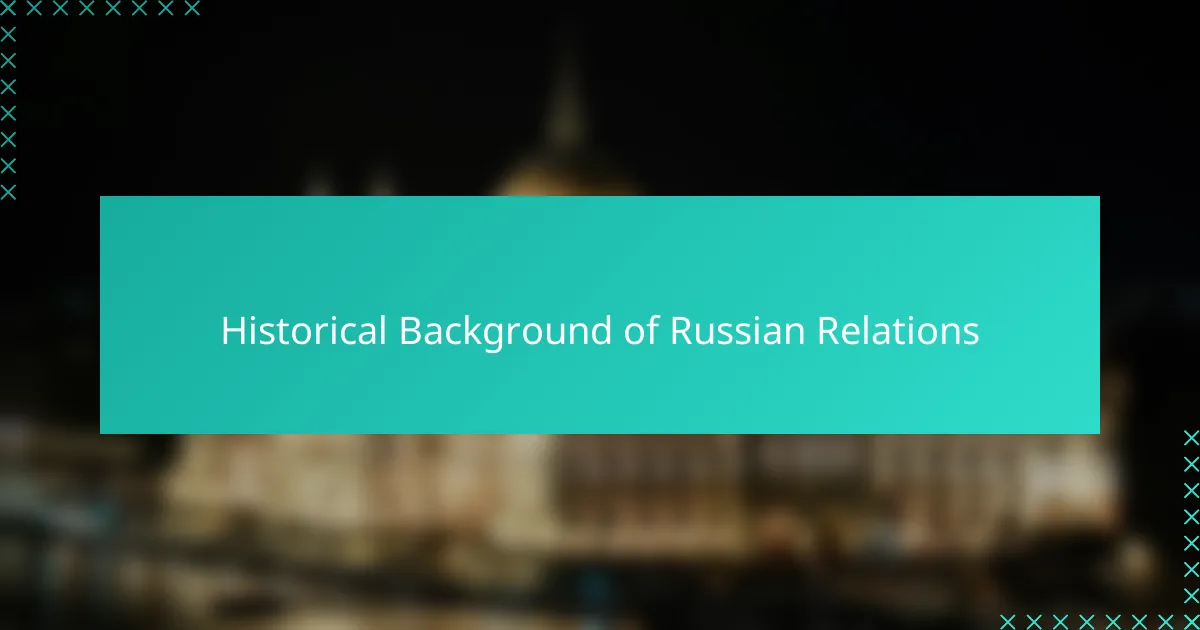
Historical Background of Russian Relations
Russia’s relationship with Eastern Europe is anything but new—it stretches back centuries, layered with conquests, alliances, and cultural exchanges. I recall studying how the Russian Empire’s expansion shaped borders and identities in this region long before modern politics took center stage. Doesn’t it strike you how historical ties still echo in today’s political debates?
During the Soviet era, I found it remarkable how Moscow’s control was both overt and ideological, binding Eastern European countries into a strict bloc yet sowing seeds of resistance beneath the surface. It’s like watching a tug-of-war where the past’s weight pulls at the present, influencing loyalties and distrust alike. Have you ever thought about how these Soviet legacies complicate current relations?
Even after the USSR dissolved, I noticed Russia maintained its grip through energy dependence and political leverage, using history as both shield and sword. This lingering influence isn’t just about old rivalries; it’s a continuous thread that weaves through the politics and identities of Eastern Europe. How often do we forget that history isn’t behind us but always with us?
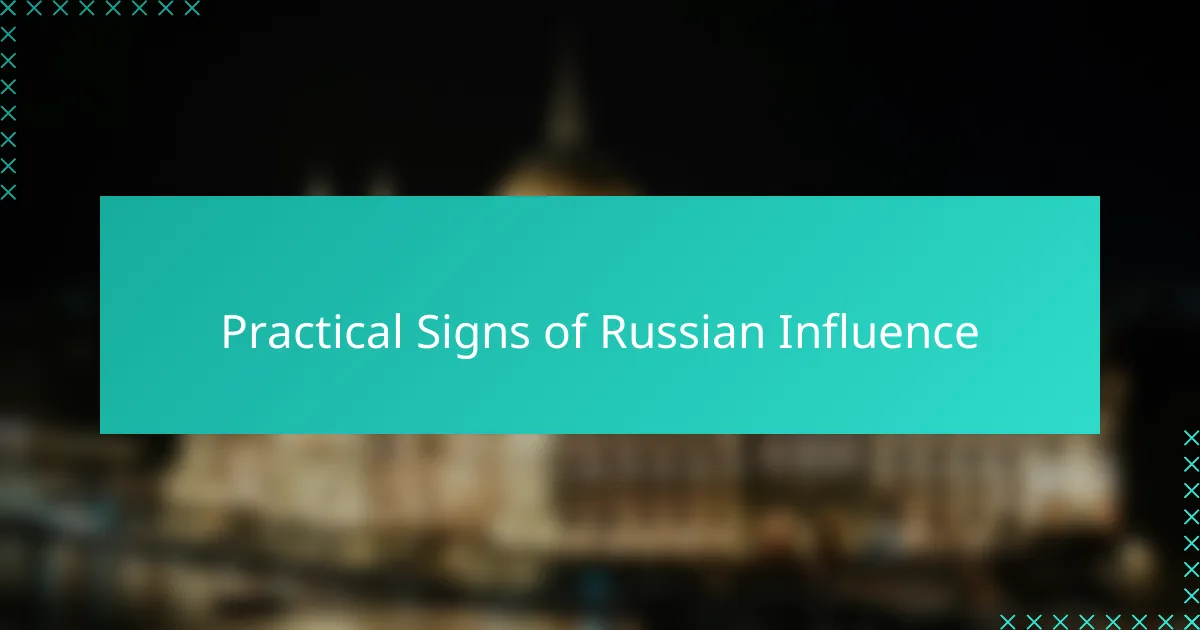
Practical Signs of Russian Influence
One practical sign I often noticed is the persistent presence of pro-Russian media outlets shaping public opinion. It’s fascinating—and somewhat unsettling—how these channels can subtly frame narratives to align with Moscow’s interests, making you wonder how much of what people believe is influenced from outside their own borders.
Energy dependence is another clear indicator. I remember talking to a local politician who described how reliant their country remains on Russian gas, creating a tangled web where political decisions often have to weigh against the risk of energy cuts. Doesn’t that make you see how influence isn’t just about politics but also about everyday life?
Then there are the political actors themselves—some openly aligned with Russia, others more cautiously sympathetic—who act as instruments of influence within governments and societies. From my perspective, witnessing this internal division shows how Russia’s presence is woven into the fabric of power, making the challenge of resistance all the more complex.
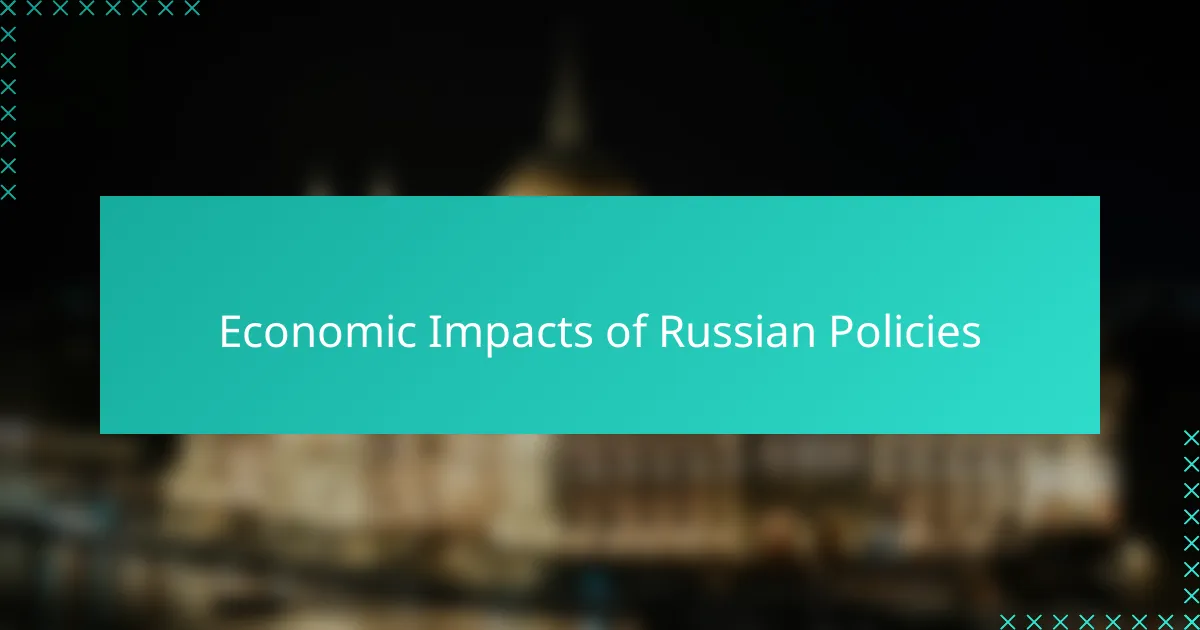
Economic Impacts of Russian Policies
Economic policies from Russia have long shaped the fortunes of Eastern European countries, especially through energy exports. I recall a meeting with an economist who explained how fluctuations in gas prices imposed sudden hardships on national budgets, forcing governments into reluctant compromises. Have you considered how a single policy decision in Moscow can ripple through the economic stability of an entire region?
What struck me the most is how trade embargoes and sanctions—both imposed by Russia and targeted at it—created a financial tug-of-war that hits ordinary citizens hardest. I’ve seen businesses struggle to navigate the uncertainty, with some sectors shrinking while informal economies quietly grow. Isn’t it striking how economic influence often plays out away from headlines yet affects daily survival?
Beyond direct financial impacts, Russia’s use of economic levers feeds into political pressure, making economic dependency a tool for control. When I talked to local entrepreneurs, they often expressed frustration at how access to markets or capital seemed contingent on Moscow’s shifting mood. This blend of economics and geopolitics reveals how deeply intertwined Russia’s policies are with the region’s economic destiny.
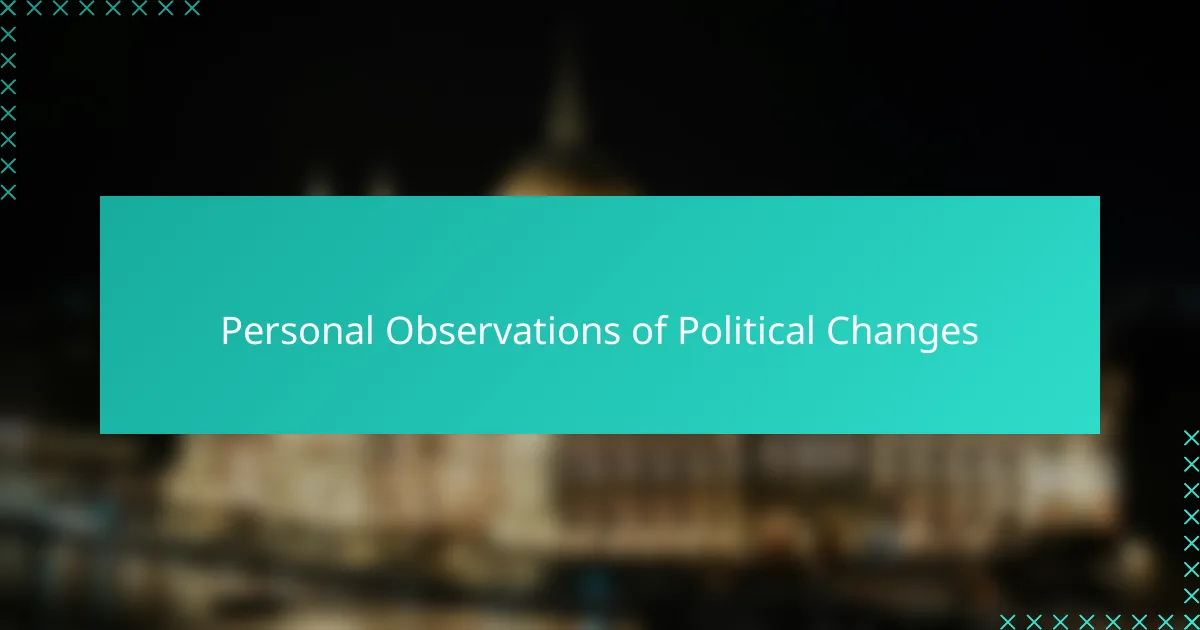
Personal Observations of Political Changes
I witnessed firsthand how sudden political shifts often followed moments of intense debate over Russia’s role. It felt like watching a chess game where every move was loaded with history and caution. Have you ever noticed how an election result or a policy change in these countries seems less about local issues and more about broader power struggles?
One observation that stuck with me was how political rhetoric increasingly echoed Moscow’s talking points, sometimes in surprising ways. It was unsettling to hear leaders adopting narratives that blurred lines between national interest and Russian influence. What does it say about a country when its own politics start reflecting an external agenda so clearly?
At times, I sensed a growing polarization within societies—families and communities divided over how to approach Russia. This wasn’t just political disagreement; it felt deeply personal, as if the legacy of past conflicts still haunted their conversations. Can you imagine living in a place where political change constantly tugs at both memory and identity like that?
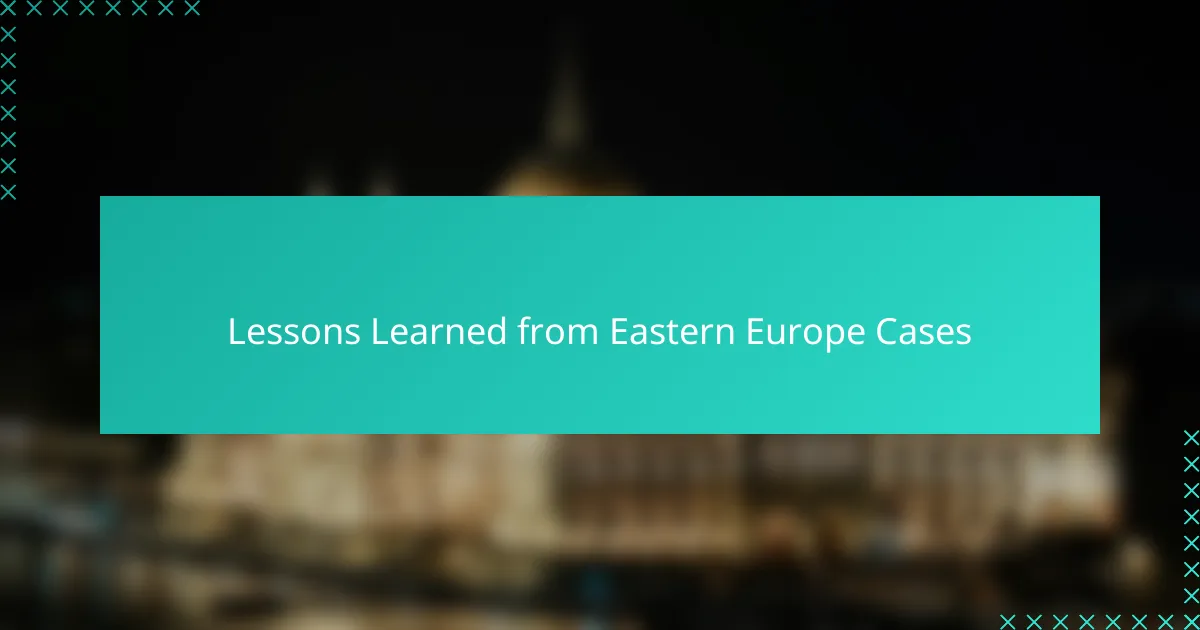
Lessons Learned from Eastern Europe Cases
What I’ve learned from observing Eastern Europe closely is that Russian influence is rarely overt; it’s often embedded in everyday realities, making it both resilient and elusive. For instance, I remember a conversation with a young activist who described how energy dependence isn’t just a political issue but a daily dilemma—choosing between economic survival and political sovereignty. Don’t you think that kind of subtle pressure is harder to break than open confrontation?
Another lesson is how history acts like a shadow over current choices, making the path toward independence uneven and fraught with nostalgia. I’ve seen communities struggle with this dual identity, caught between resisting influence and preserving cultural connections. It reminds me how deeply emotional and complex geopolitics can be when lived at the individual level.
Finally, the most revealing insight has been the role of internal actors—politicians, media, and business figures—who reflect or resist Moscow’s sway. Witnessing these dynamics taught me that influence isn’t just external force; it’s a conversation within societies themselves, full of tension and negotiation. Isn’t it fascinating how influence becomes a shared, contested reality rather than a one-way imposition?
